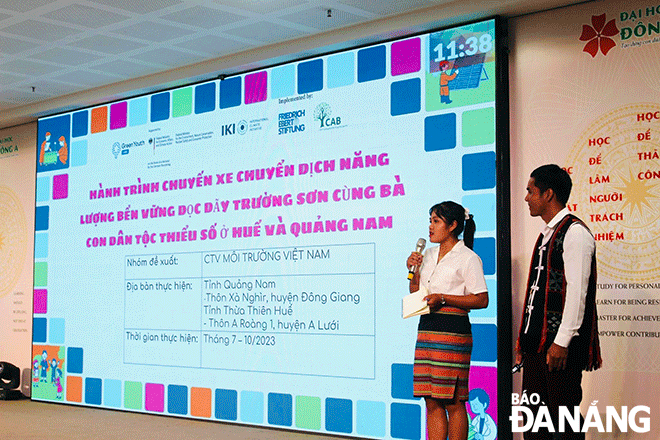Youths come up with sustainable energy initiatives
After more than 2 months of implementation, the final round of the contest ‘Youth Initiatives on Sustainable Energy’ has seen the competition by highly applicable, feasible and sustainable projects for financial, technical and project development for the community.
 |
| The Viet Nam Environment Collaborators’ group is seen making a representation on their project at the Youth Initiatives contest on sustainable energy. Photo: T.V |
The contest was under the Green Youth Labs project, jointly organised by Center for Adaptive Capacity Building (CAB), the Live & Learn organisation and sponsored by the FES Institute in Viet Nam, in order to seek young people's initiatives on sustainable energy transformation and investment and development support.
Participating in the contest, youth groups across Viet Nam seriously researched issues related to sustainable energy use and regeneration.
For example, with the project ‘Ozone water purifier with renewable energy in rural areas’, the OZO team from the Ha Noi University of Science and Technology spent many months surveying households with cloudy, smelly well water that caused allergies in the northern province of Ninh Binh. Because of polluted water, people have to buy water for use at a cost of VND50,000 – VND 70,000 per day or invest in a water filter upstream of VND 50 - VND100 million.
Facing this fact of concern, the OZO team came up with the idea of designing a water purifier with renewable energy, operated by solar panels, wind turbines, water pumps, ozone generators and device controllers.
The water purifier system can be integrated into people's existing water tanks. It has a daily water purification capacity of 0.6m3, equivalent to VND30,000 for electricity if using a water purifier or buying 20 bottles of 19 liters of drinking water. The purified water is assessed by the group according to the standards of the Vietnamese Ministry of Health before being put into use on a large scale.
“The group will replicate the project of renewable energy water purifiers in remote, isolated areas or places where clean water technology is not yet accessible. At the same time, the group wants to share information on water purification technology through classes for students to study at the school and organising a model tour for students and residents. It is hoped that, with investment support, the project will create a safe water source, about 50 - 70% cheaper than the price of traditional tap water.”, said Le Chi Tuyen, a representative of the OZO group.
Meanwhile, the project ‘The journey of a sustainable energy transfer vehicle along the Truong Son mountain range with ethnic minorities in Thua Thien Hue and Quang Nam provinces’, the brainchild by the Viet Nam Environment collaborators’ group has helped people in the villages of A Roang 1 and Xa Nghir understand more about sustainable energy conversion. The project was highly appreciated by the jury for the idea at the contest.
A representative of the group said that in 2022, the group implemented renewable energy projects in Arec, Adoc and Dhami villages, Dong Giang District, Quang Nam Province, which was completely new to the villagers.
Therefore, to help people have more knowledge about renewable energy, the team released a set of documents revolving around stories and pictures about the journey of a sustainable energy conversion vehicle along the Truong Son mountain range.
In addition, the group organised 3 related activities, including planning meetings, creating media products and organising a journey of a sustainable energy transport vehicles to the villages.
In the coming time, the group will continue to popularise creation-themed content, organise a fair to exchange goods for energy-saving equipment and solar energy, and organsze a car trip along the Truong Son mountain range in order to creative communication about sustainable energy transition.
“Experienced many difficulties, sometimes even wanted to give up, but the whole group was determined to research and survey, in the hope of helping about 270 households in 2 hamlets of A Roang 1 and Xa Nghir know and use the sustainable energy models.”, a representative of the group happily said.
Ms. Nguyen Thi Thuy Mai, the Deputy Director of the Department of Industry and Trade, member of the jury, said that the contest gathered many new and highly feasible ideas. In particular, 10 selected projects will receive financial support to deploy their projects in 6 months, thereby contributing to realising the goal of sustainable energy transition across the country.
With the same point of view, Ph.D Nguyen Anh Duy, Dean of the Faculty of Electrical - Electronics and Automation at the Da Nang-based Dong A University, said that the projects, if applied into practice, will help to solve many problems for people, such as improving their knowledge of renewable and sustainable energy and support the use of low-cost, hi-tech products.
Reporting by THUY PHUONG, TUONG VY - Translating by A.THU